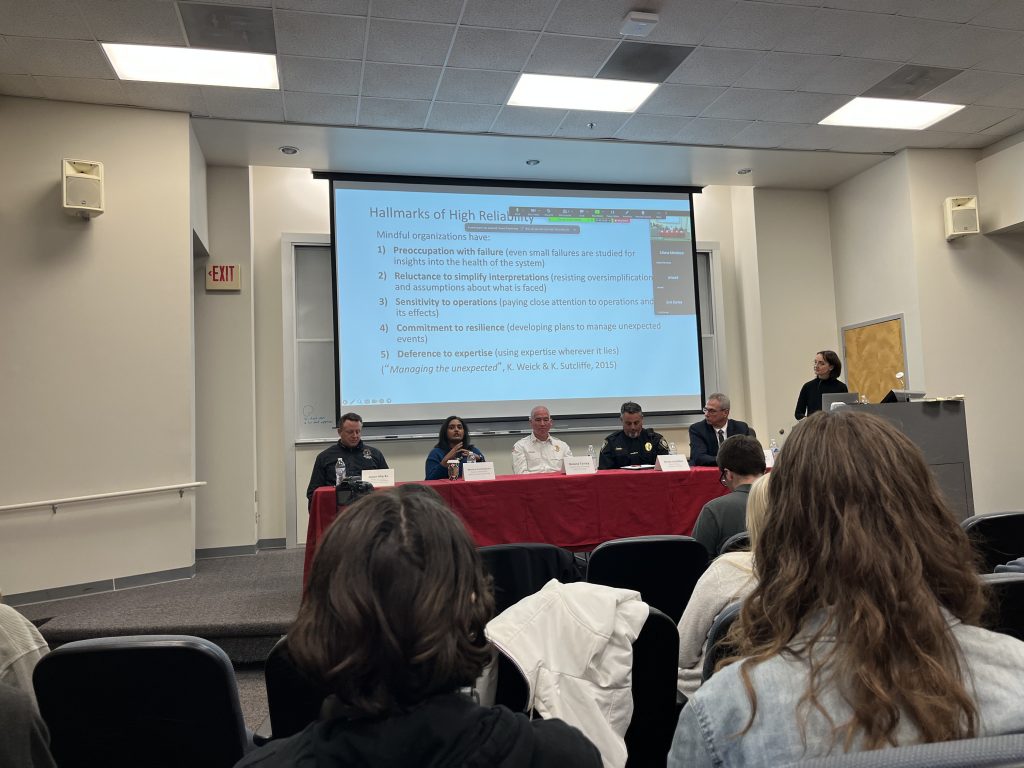
Bradley students and members of the Peoria community gathered to listen to a panel discussion hosted by the Org[anizational] Com[munication] Club titled “Expect the Unexpected.”
Communications professor Elena Gabor prefaced the discussion by mentioning recent unexpected events and introducing the Swiss Cheese model. The model, created by former University of Manchester psychology professor James Reason in 1991, shows how there can be errors or “holes” in our lives, with Swiss cheese representing these holes.
Gabor then provided stories that emphasized the importance of organizational communication, which is the field of study surrounding all aspects of communication, and being prepared for accidents.
The focus shifted to the panel at which point Gabor asked the panelists a variety of questions, including one about their most notable experiences with failure in the workforce.
“What if I told you ‘Hey, we are going to go flying and there’s a 75% chance that we will land safely,’” Gene Olson, Director of Airports, Metropolitan Airport Authority of Peoria, said. “Would you go with me?”
Olson continued by saying that people flying want a 100% guarantee that the plane will not crash and that is what aviators strive for. He provided his experience with failure in his career.
During an ice storm, the Peoria Airport runway was covered in a thick layer of ice. The new inspector working at the airport didn’t understand the severity of the hazard, so they did not alert the control tower to the hazardous condition of the runway.
A United Airlines jet containing passengers slid off the runway and into a bank of snow as a result of the communication error. Tons of sand was spread on the runway as the fire department helped passengers out of the plane and into a shuttle bus that transported them back to the terminal.
Olson expressed that if the inspector would’ve voiced the hazard, the airport could’ve been shut down before the accident occurred.
Other members of the panel shared their stories about incidents that taught them lessons about being prepared and alert.
“Life still happens after long-term events,” Monica Hendrickson, Public Health Admin for the Peoria County Health Department, said when asked how to be prepared for incidents.
Health departments all around the world still had to deal with day-to-day issues on top of the COVID-19 pandemic.
Hendrickson explained how volunteer registered nurses helped the health department remain staffed, but that everyone was still fatigued. The longer your response is, Hendrickson explained, the more fatigued one gets and the more errors there are.
In order to be prepared for anything that may occur, the panel expressed the importance of being attentive to the equipment being used and if it is running smoothly.
Jason Marks, Director of Emergency Management and Preparedness for the Peoria County Health Department, added that it can become difficult to obtain the necessary equipment in case of a rare occurrence because people do not understand that it’s needed to be properly prepared.
“Someone will ask me, ‘How is that equipment working?’ and I will have to explain that we have not used that equipment yet and that it is in case of emergencies,” Marks said. “I tell them I hope we don’t have to use that equipment because that will mean it was an emergency.”
Gabor asked the panel how important data gathering is to them and their team.
“Everything we do, we measure,” Division Chief of Training for the Peoria Fire Department Ronald Tenley said. “Those measurements are based [on] response times.”
When firefighters get into their gear, they are timed. The shorter amount of time a firefighter can correctly dress themselves, the faster they are able to respond to the scene of an emergency.
Bradley Chief of Police Brian Joschko answered by explaining that holiday breaks serve as an opportunity to train and gather more data on BUPD’s operation and consider how they can improve.
Joschko discussed the Annual Safety Report and how it gives the community accurate data about crimes that have occurred on and around Bradley’s campus.
“We are not prepared for everything that will happen in our community and we never will be,” Marks said. “If you see something, say something.”
